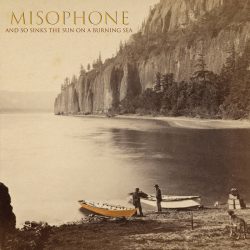No matter how (un) crowded the market for throwback lo-fi surreal ‘folk’ music, Misophone shine in a league of their own.
 If ‘And So Sinks The Sun on a Burning Sea’ were a film and not an 11-track compilation selected from over a decade of albums by British band Misophone, the one that comes first to mind could well be a Buster Keaton comedy.
If ‘And So Sinks The Sun on a Burning Sea’ were a film and not an 11-track compilation selected from over a decade of albums by British band Misophone, the one that comes first to mind could well be a Buster Keaton comedy.
That’s partly because so much of Misophone’s lively but deliberately dated music, with ingredients of classic cabaret, French cafe music, and, above all, traditional Central and East European folk at its fizziest feels close to the soundtracks for those 1920s silent movies – like Keaton’s – specialising in zany, fraught humour. However the comparison also works in terms of content, and that’s not because Misophone are particularly amusing (they aren’t). Rather, just like Keaton’s films plunge you into a topsy-turvy but entrancing parallel universe of slapstick and farce, Misophone’s lyrics pull you back into a series of mesmerising other-worlds, mostly Victorian-esque, but all, in any case, at the flick of a musical switch. Happening upon this “time machine” effect certainly makes for an odd musical experience, but once you get used to the relentlessly cob-webby feel of it all, it’s very rewarding too.
Strongly reliant on natural imagery, much of it centred around the sea, the first song, ‘White Waves’ sets the scene with its dream-like perspectives of an ocean.
“I’ll go to where the water’s green
And the white waves rise and swell
Through all the day and into night
Where the darkness of day dwells.”
The album heaves with strikingly macabre and/or melancholic predicaments – abandoned loves (‘The Year The Curtains Froze’), decaying urban settings and abandoned bodies (‘Quiet Lies’) and all-but-abandoned souls wandering around at sea wondering what their other half is up to on the shore (‘Been In The Storm’) – often expressed in slightly quaint, old-fashioned English vocabulary and phrasing. What few upbeat moments there are, quickly fade away as grimmer perspectives set in, even on ‘Swan’s Road’ one of the ‘poppier’ numbers, with pipe organ music cranking out to a playful, jaunty beat:
“And though it’s cold as bones
As the sea spits open,
I at last do feel at home
By the sun sea sloping.
Until I first do see the white
Of blind bright shimmer shaking
Under a grey white sky of light
That gives as much as taking.”
But no matter which subtle blend of genres we’re dealing with across the album, whether it be chanson-like accordions burbling away, a folky violin solo sweeping briefly across the skyline, and even when a snappy acoustic guitar strums out an introduction, the nostalgia for musical times gone by is palpable. This is, after all, a band whose first album, the snappily entitled ‘Where has it gone all the beautiful music of our grandparents? It died with them…that’s where it went.’ did set out their perspective on music from past eras with something of a vengeance.
Being so firmly anchored in times gone by, some Misophone sounds like a British version of The Handsome Family, given that band’s somewhat homespun feel, a comparable fondness for throwback melodies, and similarly unpredictable takes on the darker, lonelier sides of human existence. One big difference, though, is the singing style, which in Misophone’s case owes less to classic folk than The Handsome Family, and is more like a kind of close harmony chanting, that wraps itself gracefully and with very few musical fireworks around the strange, but always striking imagery of the songs.
Unfortunately, not all of the album flows that smoothly. ‘Ghost of Right-Wing America’, a dream-like encounter on a train with a kind of bland American male with ultra-conservative values never really gets into its own particular stride, either in music or in terms of content. It’s possibly because crazy right-wing Americans are too contemporary an issue for this kind of deliberately antiquated musical context to be effective, or simply because the singer’s peculiarly understated style deadens the feelings of fear and loathing this ghost supposedly produces. Either way, both the song and its distinctly unscary phantom don’t really produce more than indifference.
Overall, though, this is one glitch in a strange but captivating collection of songs. It helps that the album is cleverly structured as a compilation, too, starting off and finishing with tracks from Misophone’s first album, but chronological in between, which gives you two useful points of reference to look at how their music developed. Apart from being a great introduction to the band, Misophone last produced a full album in 2013, but this compilation’s publication has apparently helped inspire them to start composing again. Here’s hoping.


